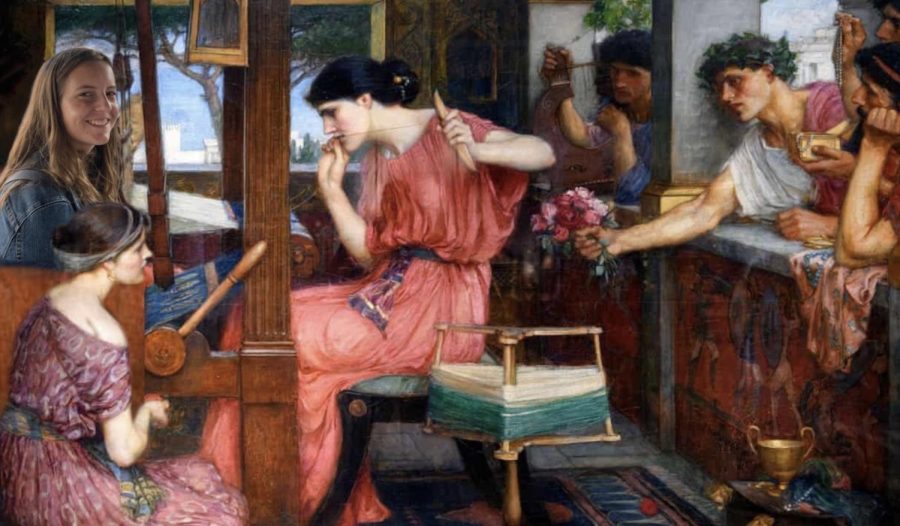Anna’s Book Nook: The Penelopiad by Margret Atwood
Photo illustration by Anna Keneally
Senior Anna Keneally laughs at the suitors who have not found it suspicious that Penelope has not made any progress on her tapestry in 10 years.
Be advised, this book contains possibly triggering content including sexual assault and rape; please farmiliarize yourself with all warnings before reading. Penelope, the famed wife of Odysseus, in Greek myth and society was praised as the poster woman for faithfulness, virtue and fidelity. While her husband was away on a 20-year journey home after already being away at war for 10 years, sleeping with a harem of women and goddesses alike, Penelope was left to fend for herself and her son with impatient suitors surrounding her. She is just about fed up and is spending her time in the Fields of Asphodel making sure everyone knows it.
The Penelopiad by Margret Atwood is the predecessor of the Madeline Miller-esque genre of Greek retellings. Instead of simply telling a story about a footnote character, Atwood makes her own claims about Penelope’s life and the lives of her 12 hanged maids. After Odysseus was assumed dead, aggressive suitors came to their home. To appease these suitors, Penelope promised to pick a new husband after she had finished her tapestry. She worked on it every day only to undo all of her work at night. When Odysseus finally returned home, he killed all of the suitors along with the 12 maids who he deemed to be unfaithful. This is what is told in The Odyssey, but Atwood looks more in-depth at Penelope, and the events that ensued, from her perspective.
Penelope, much like other women of Greek myths, seems to be made from stone: carved for a role and unfeeling of real emotions other than grief and despair. Atwood challenges this by not only giving Penelope human emotions, but also giving her ugly emotions like envy and vanity. If I were the cousin of Helen, “the face that launched a thousand ships,” I would be insecure as well. Atwood also finds it hard to believe that Penelope was just a dutiful wife and dares to ask the question: what was she really up to?
The story alternates between Penelope’s life narrations and the chilling poems and performances of the 12 maids who Odysseus had hanged. We discover in the story that the maids were raised with Penelope and were considered by her to be close allies. She used them as a way to get information from the suitors who were living in her home even if it meant putting themselves at risk. A common theme among our male heroes is their willingness to not only sacrifice themselves, but also people around them, like Achilles, who was willing to die for his honor, but also was willing to let all of his men die as well. I think this is a negative characteristic that we often do not get to see in female characters.
Today, we often equate anything disprovable as a myth. I do not think it is fair to count mythology off as inherently untrue as I have stated in other reviews. Myths hold truth within the tangible parts of society that they represent, which changes over time. This makes them moldable. I think that school is as much of a mythology as The Iliad because my idea of a myth is anything that reflects societal values. Not to get all paradoxical on you, but my definition of myth is in fact a myth by the same definition; let that sink in. Therefore, I believe that retellings are myth as well because it is not mythology’s job to define, but instead to perpetuate ideals we hold close. Today, feminism holds more truth than it did in the past, and this is reflected within The Penelopiad. The story itself is a commentary on ownership of knowledge and I would like to think that Homer made one full rotation in his urn after hearing what Atwood had to say.
Your donation will support the student journalists of Thomas S. Wootton High School. Your contribution will allow us to purchase equipment and cover our annual website hosting costs.
Anna Keneally is a 2022 graduate.










